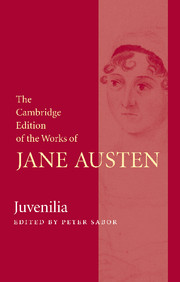Book contents
- Frontmatter
- Contents
- General editor’s preface
- Acknowledgements
- Chronology
- Introduction
- Note on the text
- Volume the First
- Volume the Second
- Volume the Third
- Corrections and emendations
- Appendix A The History of England: facsimile
- Appendix B Marginalia in Oliver Goldsmith’s The History of England, from the Earliest Times to the Death of George II
- Appendix C Marginalia in Vicesimus Knox’s Elegant Extracts . . . in Prose
- Appendix D Sophia Sentiment’s letter in The Loiterer, 28 March 1789
- Appendix E Continuations of ‘Evelyn’ and ‘Catharine’ by James Edward Austen and Anna Lefroy
- Abbreviations
- Explanatory Notes
Henry and Eliza
Published online by Cambridge University Press: 18 December 2020
- Frontmatter
- Contents
- General editor’s preface
- Acknowledgements
- Chronology
- Introduction
- Note on the text
- Volume the First
- Volume the Second
- Volume the Third
- Corrections and emendations
- Appendix A The History of England: facsimile
- Appendix B Marginalia in Oliver Goldsmith’s The History of England, from the Earliest Times to the Death of George II
- Appendix C Marginalia in Vicesimus Knox’s Elegant Extracts . . . in Prose
- Appendix D Sophia Sentiment’s letter in The Loiterer, 28 March 1789
- Appendix E Continuations of ‘Evelyn’ and ‘Catharine’ by James Edward Austen and Anna Lefroy
- Abbreviations
- Explanatory Notes
Summary
Is humbly dedicated to Miss Cooper by her obedient Humble Servant
The AuthorAs Sir George and Lady Harcourt were superintending the Labours of their Haymakers, rewarding the industry of some by smiles of approbation, and punishing the idleness of others, by a cudgel, they perceived lying closely concealed beneath the thick foliage of a Haycock, a beautifull little Girl not more than 3 months old.
Touched with the enchanting Graces of her face and delighted with the infantine tho’ sprightly answers she returned to their many questions, they resolved to take her home and, having no Children of their own, to educate her with care and cost.
Being good People themselves, their first and principal care was to incite in her a Love of Virtue and a Hatred of Vice, in which they so well succeeded (Eliza having a natural turn that way herself ) that when she grew up, she was the delight of all who knew her.
Beloved by Lady Harcourt, adored by Sir George and admired by all the World, she lived in a continued course of uninterrupted Happiness, till she had attained her eighteenth year; when happening one day to be detected in stealing a banknote of 50£, she was turned out of doors by her inhuman Benefactors. Such a transition to one who did not possess so noble and exalted a mind as Eliza, would have been Death, but she, happy in the conscious knowledge of her own Excellence, amused herself, as she sate beneath a tree with making and singing the following Lines.
Song.
Though misfortunes my footsteps may ever attend
I hope I shall never have need of a Freind
as an innocent Heart I will ever preserve
and will never from Virtue's dear boundaries swerve.
Having amused herself some hours, with this song and her own pleasing reflections, she arose and took the road to M. a small market town of which place her most intimate freind kept the red Lion.
- Type
- Chapter
- Information
- Juvenilia , pp. 38 - 45Publisher: Cambridge University PressPrint publication year: 2006

